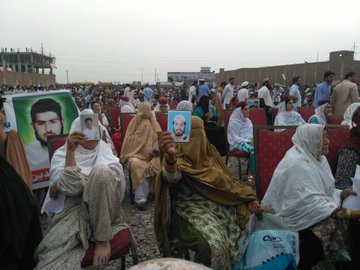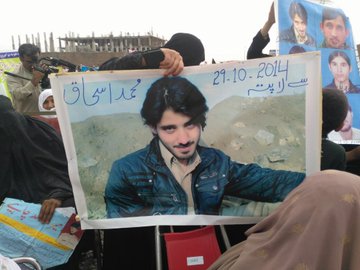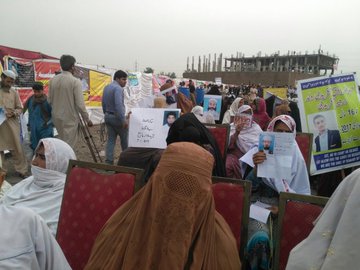By Frud Bezhan & Daud Khattak
Thousands of protesters clapped frantically and others wept as Basro Bibi, draped in a brown burqa and flanked by her young children, made an emotional plea to authorities to release her missing husband.
"My husband was picked up by the military four years ago," cried Bibi from the stage, addressing the tens of thousands of Pakistan's Pashtun minority who gathered in the northwestern city of Peshawar on April 8 to demand an end to alleged forced disappearances and harassment by authorities.
"We don't know why he was taken or where he is," added Bibi, a mother of five who lives in the Khyber tribal agency, part of the Pashtun-dominated Federally Administered Tribal Areas (FATA) in northwest Pakistan. "I urge the authorities to stop this cruelty."
Many Pashtuns claim they have been the targets of the all-powerful Pakistani Army and its notorious intelligence services, which have an oversized role in the South Asian country.
The impoverished, long-neglected, and largely lawless tribal areas became a front line in the battle against extremist groups after the U.S.-led invasion of Afghanistan in 2001, when Al-Qaeda took refuge in the region. The area has been the scene of deadly Pakistani army operations, U.S. drone attacks, and militant attacks that have uprooted millions of people and left thousands dead.
Pashtuns make up the majority of recruits and members of Pakistani-based militant groups such as the Afghan Taliban, the Haqqani network, and the Pakistani Taliban. The former extremist outfits have carried out deadly attacks against Afghan and international forces in neighboring Afghanistan, while the latter has carried out sectarian attacks against religious minorities and waged an insurgency against Pakistani government troops.
Civilians in Pashtun-dominated areas of Pakistan have borne the brunt of the violence and protesters have alleged extrajudicial killings, forced disappearances, racial profiling, and harassment by law enforcement.
"My brothers were picked up by the security forces more than two years ago," said Samia, a middle-aged woman holding a placard emblazoned with images of her two missing siblings.
"We have received the body of one of the brothers from authorities without any explanation," added Samia, whose brothers disappeared in the Swat Valley, a picturesque region in northwest Pakistan that was the scene of deadly army operations and a former stronghold of the Pakistani Taliban. "My other brother is still missing. They have young wives and children at home. We have nobody to support the family."
Samia was among thousands of women, children, and men holding up photos of their missing family members. Some held placards, while others grasped the national ID cards of the missing.
Pakistan has an estimated 40 million Pashtuns who make up roughly 20 percent of the country's population of 200 million. Pashtuns are concentrated in an arc along Pakistan's western border with Afghanistan in FATA and the provinces of Khyber Pakhtunkhwa and Balochistan.
Pashtuns in FATA live under colonial-era laws that punish an entire tribe for the crime of an individual, jail residents for up to three years without cause, and forcibly relocate people and have their property searched and seized.
"Other children are going to schools," said a 10-year-old girl from Bajaur, part of FATA, who did not give her name. "But I lost my education because my family couldn't afford to send me to school after my father disappeared."
Wiping the tears from her face with her black head scarf, she said she had to leave school when she was in the fifth grade.
The protest in Peshawar was organized by the Pashtun Protection Movement, a new protest movement advocating for the rights of the Pashtun community.
Helmed by Manzoor Pashteen, a 27-year-old activist, the movement made national headlines when he led thousands of people from the tribal areas and northwest Pakistan to the capital, Islamabad, in February. The rally, ignited by the killing of a young Pashtun shopkeeper in an allegedly staged gun battle with police in the port city of Karachi, exposed long-held grievances among Pashtuns.
Since then, rallies have been held across the tribal areas, in Khyber Pakhtunkhwa Province and neighboring Balochistan Province, attracting tens of thousands of people.
The movement has given the relatives of missing persons hope that they can be found and released.
Back on the stage in Peshawar, Bibi was ending her teary address.
"I'm compelled to speak out even though I know it's not usual for a woman to do so," said Bibi, referring to the conservative Pashtun community in which women play a limited role in public life.
"The authorities must realize that every man they forcibly disappear has a family," said Bibi, who told the audience that she has had to beg on the streets to eke out a meager living.
"Who will provide for my family? Who will send his children to school?" she said as she consoled her children on the stage.







No comments:
Post a Comment